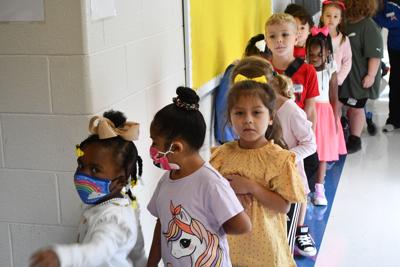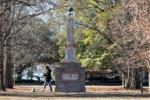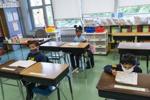If your priority is keeping COVID infections from spiraling out of control and keeping our kids in school where they need to be, there’s been a lot to celebrate over the past few days.
If your priority is the rule of law, it’s been a mixed bag.
The one clear victory on both fronts was the S.C. Supreme Court’s unanimous smackdown on Tuesday of Attorney General Alan Wilson’s nonsensical interpretation of a state law that he claimed prohibited colleges from requiring masks on campus.
The court easily could have said there wasn’t even a justiciable controversy here, since Mr. Wilson had no power to force the University of South Carolina or anyone else to rescind their mask requirements. Instead, it took the opportunity to dismantle every one of his “specious” (the court’s term) arguments. And it said the law was so painfully clear that there was no need to hear oral arguments or even allow the two sides to submit arguments beyond the initial lawsuit from Sen. Dick Harpootlian and the response brief from Mr. Wilson.
The University of South Carolina, Clemson University and the College of Charleston — apparently feeling a shift in the zeitgeist that reduced the chance that the Legislature would take retaliatory action against them — immediately ordered masks on campus. (As the court noted, and as some Republican leaders in the Senate have noted, the only thing the proviso outlaws is having different mask standards for vaccinated and unvaccinated students.)
Meantime, the boards of the Charleston County and Richland 1 school districts voted to require masks at school, and the Columbia City Council and Richland County Council ordered masks in elementary and middle schools and day cares, where children are too young to be vaccinated.
Those are clearly smart policies, policies that all school districts and cities and counties need to have to protect children who can’t be vaccinated from being infected. At least as significantly — since there’s still only a very small risk of a child getting seriously ill from COVID-19 — those are policies that are necessary to prevent the widespread quarantines that have already forced the Pickens County School District to send all its children home for remote learning and have sent nearly 1,000 students in Kershaw County to temporary remote learning until their isolation periods end.
Unfortunately, those school policies violate state law, and the Columbia and Richland County polices are written in such a way that they require school officials to choose between violating state law and being fined for the actions of others.
Columbia Mayor Steve Benjamin argues that the anti-mask proviso is unconstitutional, because the Legislature can’t use budget provisos to require actions that are only tangentially related to spending state funds. It’s sort of like the argument that the Congress can’t force states to set a 0.08% standard for drunken driving by threatening to withhold highway funding if they don’t — an argument that didn’t prevail on that law but has carried on others. We’d be shocked if the S.C. Supreme Court were to agree with Mr. Benjamin, but he at least has a respectable argument.
The Charleston County School Board, by contrast, hasn’t even tried to make a case that its mask requirement is legal. And what little board members have said about their decision — they did not debate it at all in public — suggests that they simply decided to violate the law.
Worse, the board almost certainly violated another state law when it spent two hours locked behind closed doors debating the policy. Chairman Eric Mack said the board received legal and medical briefings in the executive session — even though medical briefings are not among the reasons state law allows boards to meet in private.
The Freedom of Information Act allows public bodies to receive private legal briefings related to potential lawsuits, and the briefing from board attorneys would meet that definition. But the fact is that the only legitimate question to debate was whether or not a mask requirement would violate state law — and if so, whether to adopt it anyway.
That’s a policy debate, and it should have been held in public. Frankly, the legal briefing should have been as well, so the public could better judge the decision. State law doesn’t say legal briefings have to be held in secret; it says they may be. And the medical briefing likely would have provided useful information to the public — which just might have convinced some parents to take COVID more seriously.
Of course, we wouldn’t have these problems if the Legislature hadn’t passed an anti-public-health law that’s more about appealing to a small minority of voters than doing what’s best for our state. We understand that that small minority usually constitutes a majority in Republican primaries, and that Republican legislators are not illegitimately frightened of angering those voters.
We also understand that in June, prohibiting mask mandates in public schools looked like a safe throw-away vote, because at the time we didn’t think we’d need any mask requirements by the fall.
But the delta variant has changed all the rules, and it now threatens to make a handful of children in our state seriously ill — or perhaps even kill a few. And it promises to send tens of thousands if not hundreds of thousands of children into quarantine, throwing them back into virtual classes for up to two weeks at a time, perhaps several times in the coming school year.
Lawmakers need to return to Columbia and repeal the ban on mask requirements, so our children can get the education we cheated so many of them out of over the past two years.















